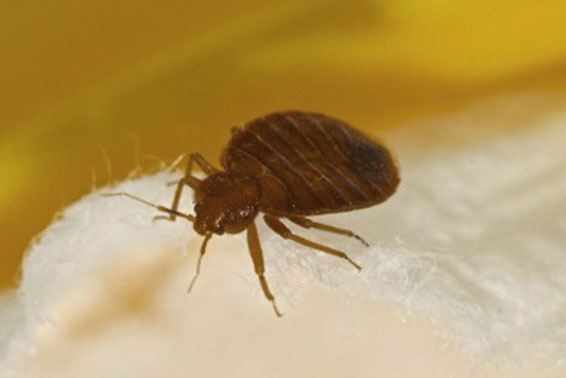
Bed Bugs are a nightmare. These little bloodsuckers can last a year and a half without a meal. They work their way into the tiniest of spaces, hide out in your bedroom and furniture, and keep biting. The little pests are masters of disguise, sneakiness, and making things itchy. Bedbugs can be very difficult to get rid of but some best practices can make managing and eventually eliminating them a smaller mountain to climb.
You can recognize if you have bed bugs when either you notice bites after a night's sleep or begin to notice blood smears or black fecal matter around your bed. Always check-in and around mattress seams, in pillowcases, and the bed frame or headboard. A fully grown bedbug is about the size of Abraham Lincoln's head on a US penny.
Foggers Don't Work:
Because bed bugs are exceptional at hiding and enjoy living in small and secluded places, a bug bomb won't work well. The aerosol mist from the fogger can't make its way into the nooks and crannies where these bedbugs are hanging out. In addition to this, foggers can be dangerous and harm you and your family if not used properly. Using a fogger properly involves some serious planning and management: you need to keep you family and pets out of the house, you need to make sure you don't have food in your home, you need to let your home air out afterward, and if they don't do the job, you can't use them too frequently without endangering you or your family.
Fumigation is Expensive:
So the foggers aren't the best choice, but what about the exterminator? Much of what he can do to help you get rid of bed bugs is rely on similar chemical pesticides to those in the foggers. If that doesn't work, he may recommend fumigating your home. The problem here is similar to those with foggers, there are parts of your home where bedbugs might be hiding that won't be affected by fumigation. In addition, fumigation treatment for your home can run you thousands of dollars and makes it a completely unviable option for many people suffering from a bed bug infestation.
In addition to all of those negatives, any poison-based control can have serious effects as well. Studies have shown that bed bugs have grown more resistant to chemical pesticides over time. In order to combat them effectively, it is essential to pursue alternatives that do not rely on poisons.
Homemade Sprays Are Limited:
There are lots of places around the internet that will tell you they have an amazing homemade spray you can use to combat bed bugs. They are often touted as a solution you can make in your home at a minimal cost and are effective at killing bed bugs. The problem is, most of these recipes will kill bed bugs only when they are treated directly. You have to find them and spray them. This can present a huge problem for actually tackling your bed bug infestation. It can be a great secondary tool for when you encounter an actual bed bug, but outside of that situation, these sprays won't help much.
Diatomaceous Earth Works:

Diatomaceous earth (DE) is a great all-round choice for combatting bed bugs. This non-chemical pesticide defeats bed bugs' ever-growing resistance to chemical pesticides. This bed bug powder is all-natural and safe to use around you and your family, so there should be no worries about getting a little on your hands or sitting somewhere that has been treated with it. You should actually sit in places that have been treated with this pesticide because it will help kill any potential bed bug hitchhikers.
How does it work?
DE looks and feels like a fine white powder but if you looked at it under a microscope, you would see hundreds of tiny shards. To humans, these shards are inconsequential; to insects like bedbugs, they are like shards of glass. DE punctures insects' exoskeletons and absorbs their internal fluids dehydrating them quickly and effectively.
Why is it a good choice?
The powder is so fine that it can be easily worked into furniture and applied in tight spaces easily, this makes it ideal for combatting an infestation which likes to hide out in places foggers cannot reach. DE is safe to use around your family by any measure and won't harm you, your family, or pets. It's a cost-effective option that can also deter future infestations when combined with some best practices for handling bedbugs.
Best Practices:
In any bed bug situation, you need to follow some of the common best practices. Regardless of how you choose to treat your home, these methods are necessary to have any success combating bed bugs.
These best practices include thoroughly cleaning your home using a vacuum and steam cleaner; washing all of your linens and clothes and storing them in airtight containers; and "hunting" for bed bugs around your home. Dismantle your bed or furniture as much as possible and vacuum your way around the pieces. Go back over the same areas and other crevices with a steamer. Wash and dry any fabric on a high heat before storing to help get rid of bed bugs and their eggs.
These best practices, when combined with an all-natural bed bug powder like diatomaceous earth, put you in the strongest position to win back your home and keep your family safer, happier, and healthier.


